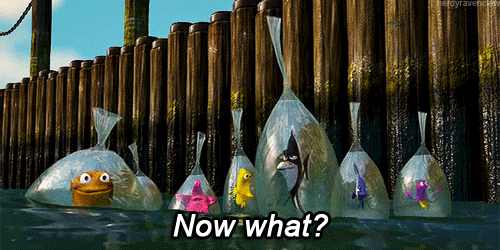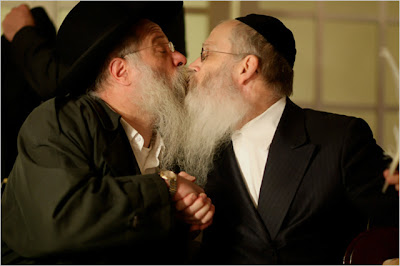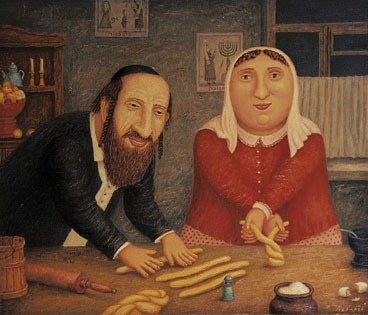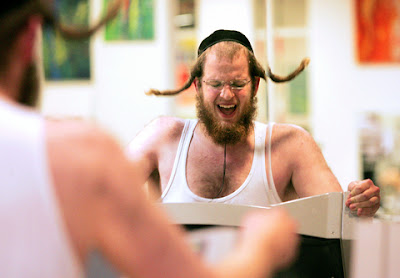I am twenty-three. I’m only out of college for a couple of years. I used to be frum (observant) but now I am off-the-derech (irreligious; literally, “off the road”).
In college, I was an observant Jew. I wanted to be part of Chabad, so right at the beginning of my college experience, I moved to a frum neighborhood and became integrated into the Chabad community. I boarded in a Chassidic rabbi’s home, and I worked for a frum family and for a Jewish educational organization. Basically, my life was the Chabad community. But then, over the past year, I became unhappy with how fake I had to be, to be a part of Chabad. It wasn’t just the queer thing—I’m gay, and that had to stay under wraps—but also I was questioning how I wanted to relate to Judaism.
Accepting the fact of being gay has always been a challenge for me, but it’s even more so for me as a religious person. In college, I realized I probably wasn’t going to be straight, although I really hoped I could be bisexual and get married and go about having a normal Jewish life. But that didn’t happen.

In the last few months when I was staying in the basement of the rabbi’s house, I came to the decision that I didn’t want to be shomer shabbos [observant of the strict Sabbatical laws] anymore, but my roommate found out and called her rov [rabbi]. Her rov told her to tell my rebbetzin [rabbi’s wife], who called me. She was like, “Call me!” That’s never a good thing to hear from your rebbetzin!
She said she knew I wasn’t keeping shabbos, and she wanted to let me know what that would entail. She explained that it meant I couldn’t cook in anyone’s kitchen, and that consequence was the natural outcome of my decision to be less observant. She said people would not be able to trust me to keep their standard of kashrus [kosher]. I decided it would be simpler to keep things as they were. Even after I left the rabbi’s basement and moved to my next home, I kept everything [shomer shabbos] for the sake of the children I took care of. I didn’t want to have my relationship with them compromised in any way. I am their caregiver, and I feel I need to stay frum for them, because they have gone through a lot of trauma already.
Unfortunately, last week I had to go to another state to take care of my sister, but those kids all call me and I read them bedtime stories over the phone—kosher stories from kosher publishers. Hopefully, I will be back soon and be able to work with them again. I definitely want to keep a connection with them, because their mother passed away almost five years ago, and their father is very sick, too. Two of the kids have special needs, and there are a lot of challenges in their home. Mostly, though, there is the trauma of losing their mother.
I was originally hired because they needed a female presence in the house. It was funny to me that I, of all people, was that person. It was a natural thing for those five little kids to see me in the role of Mommy. It was really important work. I was terribly important in their lives, and so, after a while, I couldn’t come out to them, not as gay and not as not-so-frum anymore, either. It would change our interactions. It would be another huge loss for them, and I just can’t do it to them. It would be cruel.
They still don’t know I am queer. No one knows. I hope not, anyway. It would have a very negative impact on the way I am perceived and the way people decide to interact with me. Orthodox Jews view being gay as a challenge you are meant to overcome. That view is so pervasive. I haven’t seen any gay frum people interacting with regular frum people, but I do know it happens. Just not in front of me.
I’m horribly afraid of rejection. Those people in the community mean a lot to me. I would be devastated if I lost the love of my rebbetzin’s family, and I don’t care if they are homophobic. I know if they knew I was gay, they wouldn’t receive me the same way, but they are like parents to me! I don’t want to lose them. And I really love the children who lost their mother. I want to be a part of their lives, and I would really hate for that to be taken away from me or for me to be taken away from them. We have formed a really significant bond, and it would be horrible for all of us if that were severed.
Even if the families were accepting, and they didn’t give me the whole “Overcome this challenge” speech, they wouldn’t want me around their kids because, in their minds, being gay is contagious, and it sets a bad example for the kids. People have hidden beliefs when they are Chassidic. There’s a ton of esoteric concepts, and it wouldn’t just be as obvious as “Your actions are influencing my kids.” It would be “Your neshomah [soul] is influencing my family, your soul is flawed. You are full of klipah [spiritual impurity], and it would drag down my home.” I don’t want people to be disgusted by me like that. I don’t want to be different. I don’t want to be judged.
In the frum community there is always a lot of pressure to get married and have a large family. To me, it felt very bad. I was seeing someone, a woman, but I couldn’t bring my partner to a shabbos table and have the same happy and enthusiastic reception. If I had brought a gay girlfriend to my rebbetzin, if I had been out about it, she would probably have taken me aside and given me a big talk about halacha [Jewish law] and challenges, and my needing to make sane decisions about my future, and since she has daughters, she would have been freaked out that I’d stayed in the same bedroom as her girls. She would have been horrified.
It was weird having a girlfriend while I lived in the frum community. I was very closeted, but half an hour away, in [the local gay area], I was super out. I certainly wasn’t very smart about it. I had my girlfriend come over for visits as my “friend,” and then, one shabbos, when my roommate was out of town, it was different. I had her sleep over. After the meal, we were just out walking, but my girlfriend had a tiny pride button on her coat. I made her hide it. And then, after shabbos, we were hanging out late at night, when everyone was sleeping. We were just sitting in my car, and she leaned over and kissed me, and I had a fit! It was 3:00 a.m., but I was so afraid we would get caught. She laughed at me. Who would see? I was so paranoid, I started coming up with a list. “A jogger!” I said. “Someone who works in a bakery!” Who knows? That’s how it is when you could lose everything. I was very clear about it. I knew I could lose my job, my finances, my housing, my friends, my community, my adopted family. And I couldn’t afford to lose all that.
Anyway, when I had already been part of the Chabad community for a while, my rebbetzin sent me away to a religious seminary. The seminary rabbi gave an explanation for why people are gay. That was so uncomfortable! It was the worst explanation ever! He said, “If either the husband or the wife in a marriage is repulsed by their spouse, it can cause the child born from them to be gay.”” If the husband isn’t into his wife, then the son is going to be attracted to men. Wow! I kept on hearing these dumb explanations: “It’s a choice!”” “H-shem [G-d] doesn’t give you challenges you can’t handle.” I davened [prayed] so long and so hard to have this problem go away, but nothing changed. I couldn’t handle it, but I still had the challenge!
Also, in the seminary, trans people and sexuality in general were always made fun of and looked down on. They were discussed as disgusting things to be shunned. One person asked, “Which side of the mechitza does a trans woman sit on?” and Rabbi B [an internationally known rabbi] said, “That’s like a person who wants to be an elephant.” He turned it into a joke. It was so upsetting. Anyone who happened to be part of the queer spectrum would have been pushed far away from Yiddishkeit by Rabbi B’s response.
Even then, I knew Jewish trans people. All queer people have so many struggles, and trying to fit into the frum community is difficult for them, but it’s infinitely more challenging for trans people. As a result of the seminary rabbi, I became alienated and distanced. I felt like I wasn’t going to fit into the Chabad community, no matter how I behaved, or that there was something fundamentally wrong with me. Eventually, I felt suicidal and ended up in hospital for a while, trying to work through my feelings about queerness and Judaism. The rabbi in whose house I lived at that time wasn’t too excited about my being sick, and his family barely spoke to me after that. It was part of the reason I had to move out of that house. And afterward, I was different, not as involved in Chabad life, but still connected.
So many people in [the local gay area] have had bad experiences with religion and want nothing to do with it. So, in that area, I can’t be out about being Orthodox! I don’t fit in anywhere. All I want is to fit in and be normal . . . frum and gay. And not stigmatized. I still don’t know how to reconcile these two parts of myself. Before I had to leave to take care of my sister, I hung out with people who used to be frum. We got together on Friday night. We made kiddush, we made a seuda [meal] on shabbos day, but we went out on dates right afterward.
Even now that I don’t eat kosher, I’m completely unwilling to eat treif [nonkosher] meat. I don’t keep shabbos, but I wouldn’t ever light after licht bentshen [the time to light candles on Friday evening]. I still daven shacharis and mincha [pray the morning and afternoon services, about an hour’s worth of prayer] every day. My partner is upset at how religious I am, and at me being shomer shabbos. It feels like I can never satisfy both parts of myself.
My partner and some of my non-frum friends ask me why I don’t just do all the mitzvos, or do none and trick the people I work for. I couldn’t do that. My rebbetzin is very honest herself. Most frum Jews are very careful about that, but she is special. She asks me to be honest about my level of observance, to understand what I could lose by not being frum. She innocently trusts me to say the truth about whether or not I am shomer shabbos. I can’t betray that trust. Now that I am living with my sister, my rebbetzin calls me up and asks me to keep shabbos and go to shul [synagogue].
I wish I could come out to her, but once, my roommate was at a shabbos meal with me, at my rebbetzin’s house. One of her little girls was playing with my roommate’s ring. The girl took it off my roommate’s finger and then put it back on again and said, “Harei at mekudeshes li [“Behold! You are consecrated to me,” the traditional words at a Jewish wedding ceremony]. We are married now!” My rebbetzin laughed and then frowned and said, “How would that even work with two girls? It’s impossible!” My rebbetzin made being a lesbian into a joke! It’s crazy, because she knows women who are lesbians, even women who are lesbians in the frum community. She had a very close friend who turned out to be a frum lesbian.
I know two lesbians in the local Chassidic community. One of them is the head of an organization for gay frum Jews. When I didn’t know anyone frum and gay, I somehow found the book Keep Your Wives Away from Them. I looked at all the contributors’ info, and then I searched the names until I found a phone number for one of them. I called her up, and she was really understanding. I was in seminary at the time, so we met clandestinely. I met her wife, too, and we had a whole conversation about being queer and frum. She gave me the contact information for a frum lesbian in my community. It was all word of mouth.
When I went to the frum lesbian’s house for a shabbos meal, it was the most authentic meal I’d ever been to. It was beautiful! Then, when I returned to my rebbetzin’s house, I realized how closed down I had to be in her house, and how much I didn’t want to be like that. My rebbetzin’s home is open and inviting, as long as you fit their picture.
In my experience, there has only been one rabbi who was compassionate to my whole situation. Because of his accepting attitude, I came out to him. I wanted to ask him what I should do. I told him I struggled with attractions that are inappropriate, and he said, “To women?” He said it’s not the most important thing to get married and have a family. He said there are other things you can do as a Jewish woman. He also referenced a gay man who got married and had a kid. He didn’t freak out at me, but he still had this idea that if I really wanted to, I could change. He was a baal teshuva [returnee to Judaism], and he was supposedly a hippie before he became frum, so that might have affected his worldview.
Maybe hippies really have it right. I’m a big fan of Ve’ahavta lerei’echa kamoicha [Love your neighbor as yourself]. There aren’t any strings attached to that. There’s no “so long as your fellow Jew is . . . ” It’s not, Love these Jews but not those Jews. That’s the whole point. My rebbetzin really stressed the idea of the community waiting for everybody to be back from the Bais Hamikdash [Temple] before davening for rain. We wait for everyone, and everyone is important, no matter who they are or what their level of observance is, no matter what their challenges are. That was inclusive instead of exclusive. I want the community to be like that. You can’t be afraid of other people, and exclude them, and have this negative view, and really be holy.
NB. These photos are only used for illustrative (or humourous) purposes and do not represent the people described in this article.










































.jpg)











